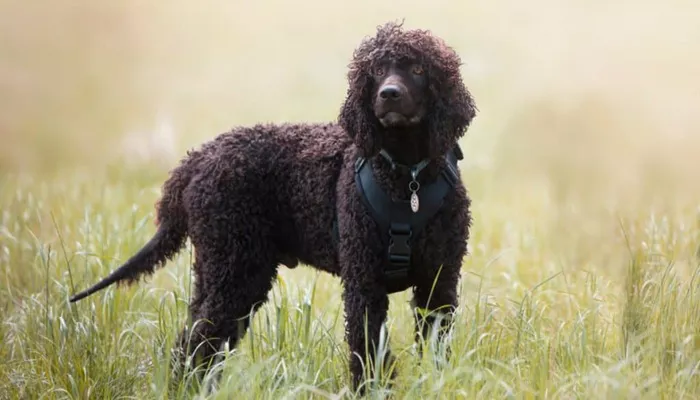The Irish Water Spaniel (IWS) is a unique and intelligent breed known for its distinctive curly coat and exceptional swimming abilities. Originating in Ireland in the 19th century, this breed was developed for retrieving waterfowl in harsh conditions, making it a versatile hunting companion . Today, the IWS is cherished not only for its working skills but also as a loyal family pet. However, adopting one requires a deep understanding of their needs and characteristics. This guide will walk you through everything you need to know before bringing an Irish Water Spaniel into your home.
Understanding the Breed: Key Characteristics
Physical Traits
The Irish Water Spaniel is a medium-sized dog, standing 51–58 cm tall and weighing 20–30 kg. Its most striking features include:
- A tight, waterproof liver-colored curly coat (resembling a “poodle’s curls”) that protects it in cold water.
- A smooth “rat-like” tail and a topknot of loose curls on the head.
- Webbed feet, which enhance its swimming prowess.
Temperament and Energy Levels
This breed is highly intelligent, energetic, and playful. Key personality traits include:
High energy: Requires 60–90 minutes of vigorous exercise daily.
Loyalty: Forms strong bonds with family but may be reserved with strangers.
Problem-solving skills: Known for their independent thinking, which can translate to stubbornness during training.
Preparing for Adoption: Is the Irish Water Spaniel Right for You?
Lifestyle Compatibility
Active households: Ideal for owners who enjoy outdoor activities like hiking, swimming, or agility training.
Space requirements: A house with a yard is preferable, though apartment living is possible with sufficient exercise.
Time commitment: This breed thrives on human interaction and may develop destructive behaviors if left alone for long periods.
Financial Considerations
Initial costs: Adoption fees range from 800–2,500, depending on the source.
Ongoing expenses: Budget for high-quality food (60–80/month), grooming (50–100/session every 6–8 weeks), and veterinary care.
Family Dynamics
Children: Generally good with older kids who respect their space but may unintentionally knock over toddlers due to their exuberance.
Other pets: Early socialization is critical; some IWS may chase smaller animals due to their hunting instincts.
Finding a Reputable Source for Adoption
Ethical Breeders
- Look for breeders registered with organizations like the American Kennel Club (AKC) or Irish Water Spaniel Club of America.
- Ask for health clearances for hip dysplasia, eye disorders, and hypothyroidism—common issues in the breed.
Rescue Organizations
Breed-specific rescues: Groups like the Irish Water Spaniel Rescue Network often have adults needing homes.
Shelters: While rare, IWS occasionally appear in general shelters. Check platforms like Petfinder regularly.
Red Flags to Avoid
- Puppies sold under 8 weeks old.
- Breeders who refuse to show parent dogs or living conditions.
- “Bargain” prices (under $600), which often indicate poor breeding practices.
Caring for Your Irish Water Spaniel
Grooming Essentials
Coat maintenance: Brush weekly to prevent mats, and trim every 2–3 months. Use a slicker brush and dog-safe detangling spray.
Ear care: Clean weekly with a vet-approved solution to prevent infections due to their floppy ears.
Nail trimming: Monthly trimming to avoid overgrowth and discomfort.
Dietary Needs
High-protein diet: Opt for formulas with 22–26% protein to support their active lifestyle.
Portion control: Feed 2–3 cups daily, split into two meals to prevent bloat.
Exercise Routines
Water activities: Swimming sessions at lakes or pools fulfill their natural retrieving instincts.
Mental stimulation: Puzzle toys, scent games, or obedience training to prevent boredom.
Training and Socialization Strategies
Positive Reinforcement Techniques
- Use treats and praise to reward desired behaviors. Avoid harsh corrections, as this breed is sensitive.
- Focus on commands like “come,” “leave it,” and “drop” to manage their hunting urges.
Socialization Timeline
8–16 weeks: Expose to diverse environments, people, and animals.
6–12 months: Enroll in advanced obedience or agility classes to channel their energy.
Common Behavioral Challenges
- Separation anxiety: Gradually acclimate them to alone time using crate training.
- Excessive barking: Redirect attention with toys or commands like “quiet”.
Health Management and Lifespan
Common Health Issues
Hip dysplasia: Regular vet checks and maintaining a healthy weight can mitigate risks.
Ear infections: Weekly cleaning and drying ears after swimming are essential.
Hypothyroidism: Symptoms include weight gain and lethargy; treatable with medication.
Preventive Care
Vaccinations: Follow core vaccines (rabies, distemper) and discuss leptospirosis due to their water exposure.
Parasite control: Use flea/tick preventives monthly and deworming treatments as advised.
Average Lifespan
With proper care, Irish Water Spaniels typically live 10–12 years.
Conclusion
The Irish Water Spaniel is a rewarding companion for active, patient owners who appreciate its quirky charm and boundless energy. While their grooming and exercise demands are significant, their loyalty and intelligence make them a joy for the right family. Always prioritize adoption from ethical sources and commit to lifelong care to ensure your IWS thrives.
By understanding their unique needs and preparing thoroughly, you’ll be ready to welcome one of the most distinctive and loving breeds into your home. For further details, consult breed-specific resources like the Irish Water Spaniel Club of America or connect with experienced owners through online forums.
Related Topics:
HOW MUCH EXERCISE DO IRISH WATER SPANIELS NEED
HOW OFTEN DO YOU GROOM AN IRISH WATER SPANIEL
DO IRISH WATER SPANIELS BARK A LOT?


